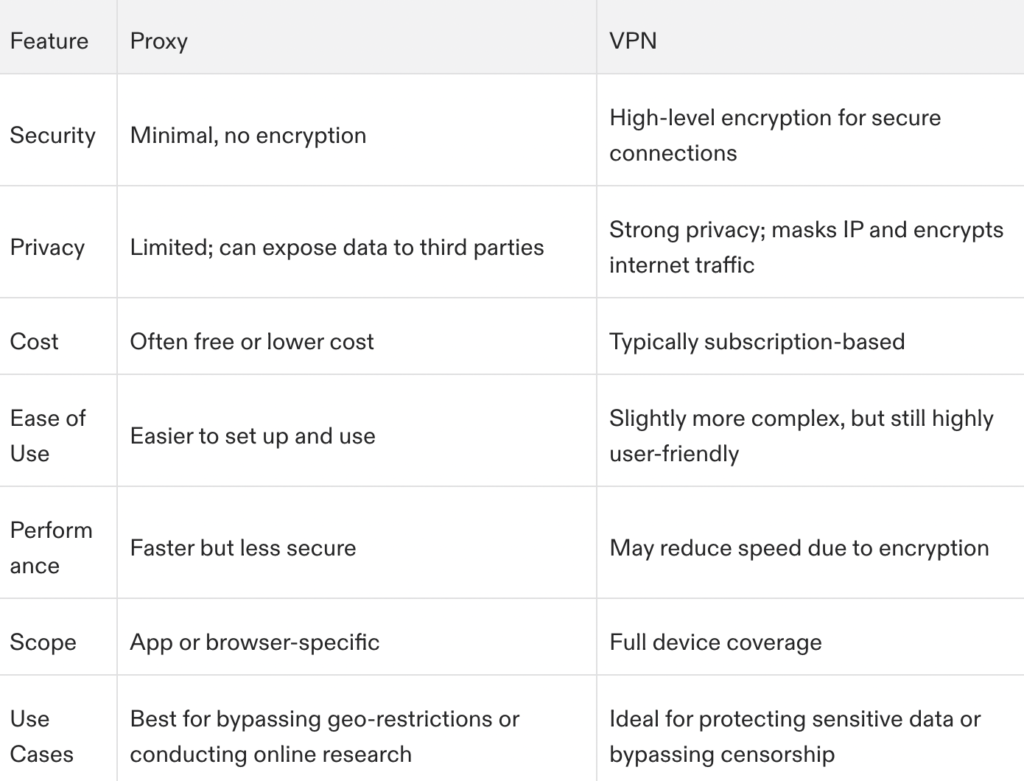Proxy vs VPN: What Are the Differences?

When it comes to protecting your data, overcoming geo-restrictions, or maintaining anonymity online, the terms “proxy” and “VPN” often come up. But what exactly are they, how do they differ, and which one is right for you? This guide breaks it all down, helping you decide on the best tool for your online needs.
What Is a Proxy?
A proxy acts as an intermediary between your device and the internet. When you use a proxy, your internet traffic is routed through a server, masking your IP address and replacing it with the IP of the proxy server. This makes it seem like your traffic is coming from a different location.
Key Features of Proxies:
- Access Geo-Blocked Content: Proxies allow users to bypass geographic restrictions by providing a virtual location.
- No Encryption: Typically, proxies don’t encrypt your internet traffic, making them less secure.
- Single Application Use: Proxies usually work on a specific app or browser rather than encrypting your entire internet connection.
Use Cases for Proxies:
- Bypassing Geo-Restrictions: Access streaming platforms or websites restricted to certain regions.
- Web Scraping: Collect data from websites by rotating proxies to avoid IP blocks.
- Ad Verification: Check how online ads display in various locations.
- Gaming: Reduce latency or access region-locked content.
- Social Media Management: Handle multiple accounts without running into bans.
- SEO Research: Analyze local search engine rankings.
What Is a VPN?
A VPN (Virtual Private Network) creates a secure, encrypted connection between your device and a remote server. This encrypted “tunnel” protects your data and hides your online activities, providing both privacy and security.
Key Features of VPNs:
- High-Level Security: VPNs encrypt traffic, preventing hackers, ISPs, and even governments from seeing your activity.
- Full Device Protection: VPNs secure all online activity on a device, not just traffic from a specific application.
- Bypass Censorship and Restrictions: VPNs make it possible to access restricted websites and services in countries with stringent internet laws.
Use Cases for VPNs:
- Online Privacy and Security: Encrypt data and stay safe on public Wi-Fi.
- Accessing Restricted Content: Stream region-locked Netflix shows or bypass internet restrictions in censored countries.
- Remote Work Security: Safely connect to your company’s network while working from home or abroad.
- Torrenting: Mask your activity and protect your identity when downloading files.
- Avoiding Bandwidth Throttling: Prevent ISPs from slowing your connection speeds.
- Anonymous Gaming: Protect yourself from DDoS attacks during online gaming.
Proxy vs VPN: Key Differences
Here’s a side-by-side comparison of proxies and VPNs:

When to Use a Proxy
Proxies are best for tasks that don’t require high levels of security. If you’re a marketer, researcher, or gamer, proxies might fit your needs perfectly:
- Need to scrape data without revealing your IP? Go for rotating proxies.
- Want to check competitor ads or monitor e-commerce trends? Proxies can help.
- Looking to access restricted gaming servers? Proxies are a lightweight, effective solution.
Proxies are also cost-effective and quick to set up, making them an attractive option for tasks that don’t involve sensitive data.
When to Use a VPN
VPNs shine in scenarios where security and privacy are paramount. If you frequently handle sensitive information or want peace of mind while browsing, a VPN is essential:
- Worried about cyber threats while using public Wi-Fi? Use a VPN to encrypt your connection.
- Need to work remotely? A VPN keeps company data secure while you access it from any location.
- Want to bypass censorship or stream region-locked content? A VPN provides unrestricted access and anonymity.
VPNs are also reliable for anyone who wants to browse, game, or torrent without ISPs throttling their speeds.
Can You Use Both?
Yes, in some scenarios, combining proxies and VPNs can maximize the advantages of both. For example:
- Web Scraping + Privacy: Use proxies to collect data at scale, and a VPN to secure the connection.
- Privacy-Conscious Streaming: Use a proxy to unlock region-specific content and a VPN for encryption while streaming.
Combining these tools can provide both flexibility and security for specific use cases, but it’s important to understand each tool’s role to use them effectively.
Closing Thoughts
Choosing between a proxy and a VPN comes down to your specific needs. For lightweight, task-specific actions like accessing geo-blocked content or conducting web research, proxies are quick, easy, and efficient. If data security, privacy, or online freedom are your priorities, VPNs are the superior choice.
Whether you want to enhance your privacy or streamline your workflows, understanding these tools allows you to make informed decisions. Both have their strengths—use them smartly based on your goals.
Still unsure which one is right for you? Share your use case in the comments, and we’ll help you figure it out!
Table of Contents

Matthew Williams
Proxy and tech enthusiast
